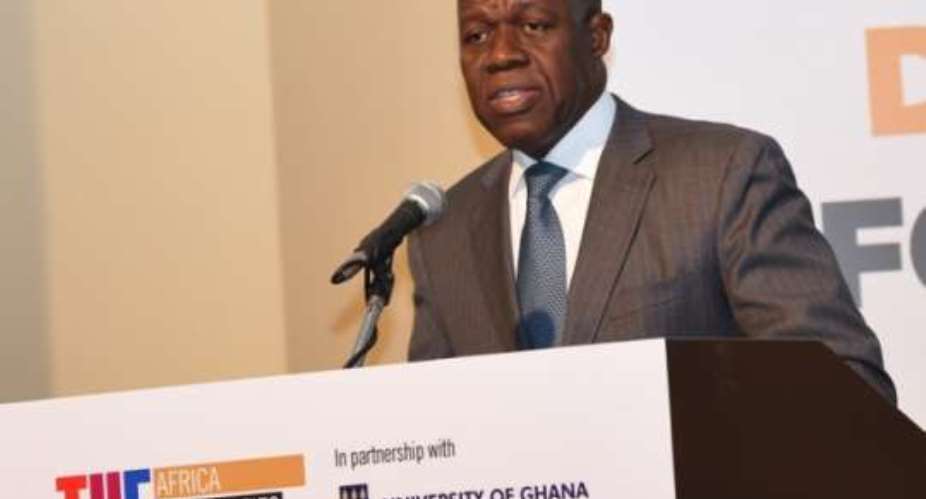Christopher Arko, GNA
Accra, April 28, GNA - Vice President Kwesi Amissah-Arthur has charged African Universities to develop critical ideas for the continent's progressive development and challenge the traditions, which tend to impede progress.
He said African Universities could not afford to stand still in the face of globalisation because they risked being overtaken and, eventually losing their relevance.
Vice President Amissah-Arthur made the statement at the opening of the second summit of the Times Higher Education Africa Universities, at the University of Ghana, Legon.
The two-day conference which is on theme: 'Globalisation and Policy Directions for African Higher Education', is being attended by delegates from the various African Universities, other tertiary and research institutions, and the Times Higher Education.
Vice President Amissah-Arthur stated that statistics from Ghana's public universities suggested that the lessons of globalisation and the impact of technological change had not been taken seriously.
At present, the Times Higher Education Africa Universities has ranked the University of Ghana 7th in Africa.
Vice President Amissah-Arthur, however, stated that African Universities, in spite of their resource constraint, were subject to the new information-driven global economy with the expectation for them to survive and thrive as market-like organisations, like their counterparts elsewhere.
He said for African Universities to continue to be relevant for the people to finance their activities they must re-invent and maintain their significance in the pursuit of scholarship and excellence by developing and maintaining high academic standards.
For African tertiary institutions to safeguard their future, they must identify sustainable ways of financing their activities through a strong governance system that pursued financial integrity and transparent accounting for the application of taxpayer resources.
He said for the universities to be free from interference to teach and research it was crucial for them to identify new and efficient ways of delivering their output.
He said student intake was still dominated by the Humanities, with close to 60 per cent of students in the public universities pursuing courses in those fields.
He said gender access still fell below the standards with female students just constituting a third of the student population, while only a third of that were enrolled in scientific-oriented courses.
Professor Ernest Aryeetey, the Vice Chancellor of the University of Ghana, addressing the theme, 'Globalisation and Policy Directions for African Higher Education', stated that the expansion of globalisation over the past two decades had benefited those in Europe, America and East Asia than the rest of the world.
He said globalisation provided both opportunities and risks, explaining that the better -structured a country was, the easier it was for it to take advantage of the prospects it provided.
He said globalisation on higher education around the world came with a revolutionary means of teaching, especially with the use of digital devices, communication between the professors and students, while the governance of most institutions also had changed.
Professor Aryeetey said under globalisation, there was expansion in the delivery of goods and services, including education services, which had resulted in the establishment of multinational universities, Massive Online Open Courses (MOOCs) and the importation of large numbers international students.
However, some of these institutions lacked the franchise to run most of the programmes, he said.
He said globalisation had impacted African Universities negatively with its large numbers of students, which had also affected the quality of students produced, as well as the development of relevant courses and the provision of quality equipment.
Professor Aryeetey also stated that currently most African public Universities were competing for staff with private universities and for resources with foreign universities.
He said the reasons why most African Universities were internationalising was to produce students with global perspectives and also to have cross-fertilisation with students from other universities.
Professor Ihron Rensburg, the Vice Chancellor, University of Johannesburg, said the first Times Higher Education Africa Universities summit in Dakar, last year, challenged educational authorities on the continent to nurture the next generation 200 Centres of Excellence.
He said it was evident that the focus of the African Universities over the past five decades had been to drive participation and inclusion in the university system.
Professor Rensburg, however, stated the current contribution of Africa to the global economy was only two percent, which he said must change.
He said the partnership between Times Higher Education, the University of Ghana and the other universities should yield ideas to ensure Africa's rise over the next two generations.
GNA





 We’ll no longer tolerate your empty, unwarranted attacks – TUC blasts Prof Adei
We’ll no longer tolerate your empty, unwarranted attacks – TUC blasts Prof Adei
 Bawumia donates GHc200,000 to support Madina fire victims
Bawumia donates GHc200,000 to support Madina fire victims
 IMF to disburse US$360million third tranche to Ghana without creditors MoU
IMF to disburse US$360million third tranche to Ghana without creditors MoU
 Truck owner share insights into train collision incident
Truck owner share insights into train collision incident
 Paramount chief of Bassare Traditional Area passes on
Paramount chief of Bassare Traditional Area passes on
 Two teachers in court over alleged illegal possession of BECE papers
Two teachers in court over alleged illegal possession of BECE papers
 Sunyani: Victim allegedly shot by traditional warriors appeals for justice
Sunyani: Victim allegedly shot by traditional warriors appeals for justice
 Mahama vows to scrap teacher licensure exams, review Free SHS policy
Mahama vows to scrap teacher licensure exams, review Free SHS policy
 Government will replace burnt Madina shops with a new three-story, 120-store fac...
Government will replace burnt Madina shops with a new three-story, 120-store fac...
